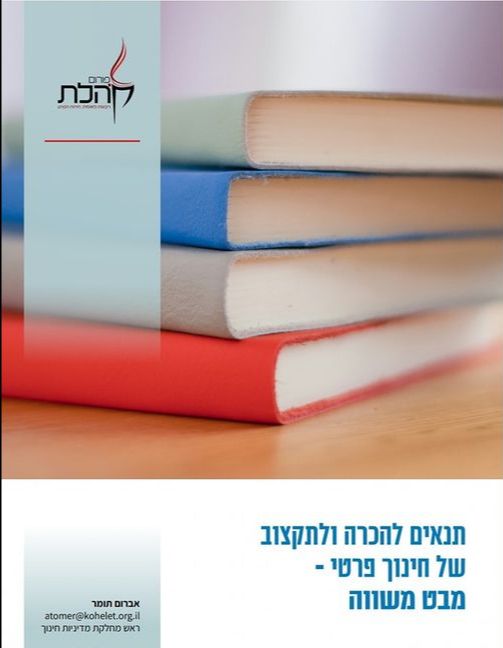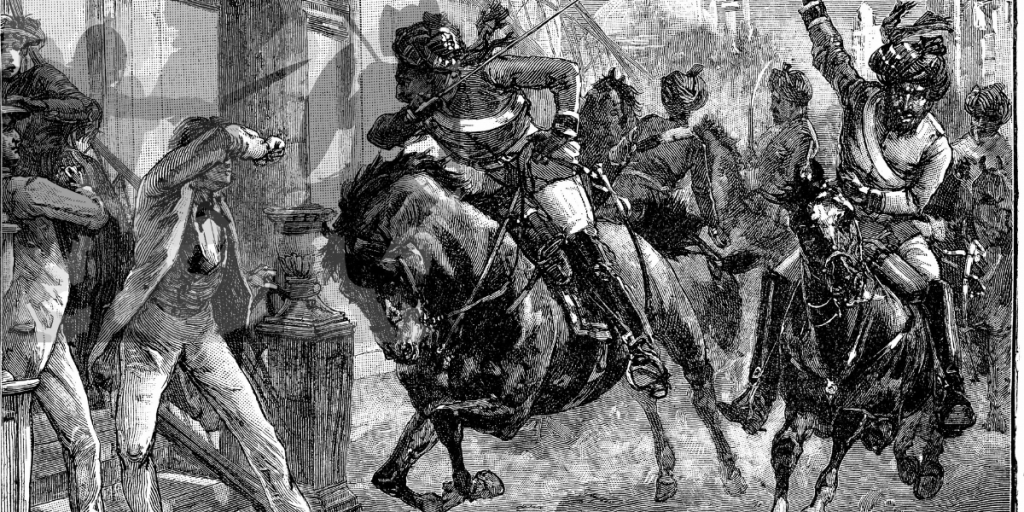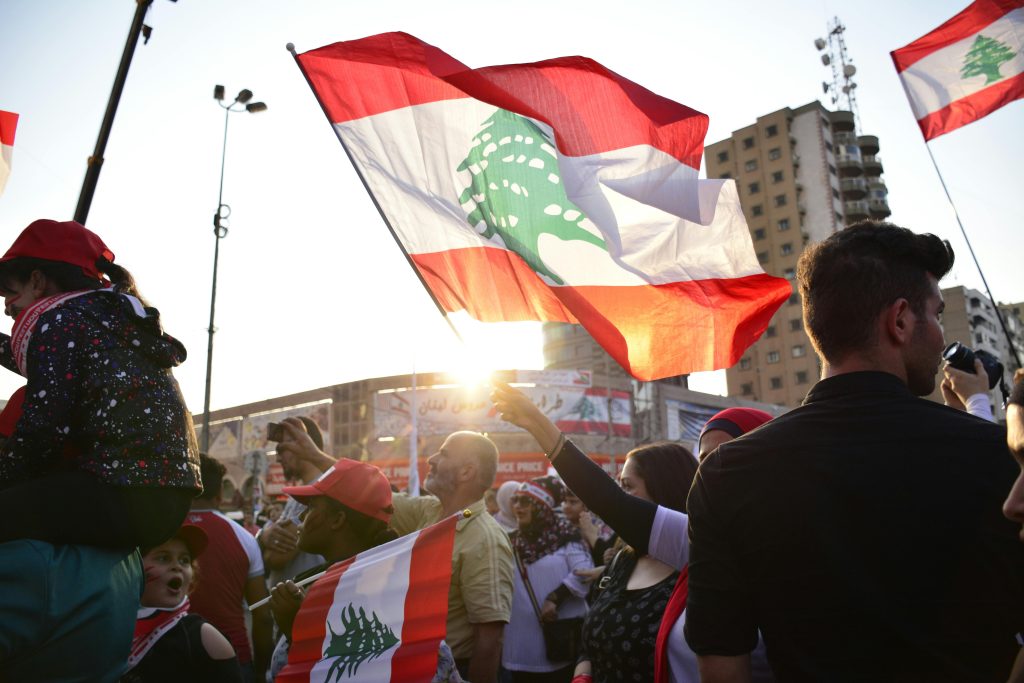A new policy paper by Avrum Tomer, Education Policy Dept.
This paper addresses two current issues: (1) the question of the State’s attitude in general towards the private schools it funds and supervises; and (2) the promised additional funding to Haredi school networks that fails to consider the public interest, through a study of the public funding requirements for private schools in Israel as compared to other Western countries.
Summary:
There are three types of schools operating in Israel today:
- Official schools – schools owned by the state (or in rare cases by the municipality), committed to a complete curriculum of core studies.
- Recognized but unofficial schools – privately owned schools recognized by the state but committed to only 75% of core studies hours and funded at the rate of 65%-75% of official schools’ budgets.
- Exempt schools – Haredi schools unrecognized by the State and only narrowly supervised. They receive 55% of the official schools’ budget and are obligated to teach core studies proportionately.
Most Haredi schools belong to the “recognized but unofficial” category, but most are also considered exceptions: According to Article 3a of the 1985 Budgetary Principles Law, the Independent Education system (identified with the Ashkenazi Haredi parties) and the Shas affiliated Ma’ayan HaChinuch HaTorani network are “funded by the Ministry of Education and Culture’s budget for educational purposes only, according to the same criteria for both corporations and on the basis of objective, uniform and equal criteria as for all children in Israel”, i.e., their funding should be equal to that of official schools and obligated accordingly to teach a full curriculum of core studies.
In the coalition agreement between the Likud party and the United Torah Judaism faction drawn during the formation of the 37th government, it was agreed that “all Haredi institutions will, from 2023, be fully incorporated as a whole into the Ofek Chadash (New Horizon) and Oz Le’tmura [Courage to Change] reform programs, similar to public education.” Since this translates into a significant salary increase for teachers in Haredi schools, the expected result of the additional budget is that Haredi networks’ budget would be raised above the official schools’ budget, since they are already funded at a similar rate to that of official schools.
Aside from the risks involved in such a move, the current moment represents an extraordinary opportunity to implement one of the most important changes necessary to the field of education; namely, amending the State Education Regulations (Recognized Institutions). Correctly amending these regulations will serve to promote the instruction of core studies and proper administration in the Haredi education system, but it can also serve to correct the current injustice in the state’s attitude towards other recognized but unofficial schools which have for many years been suffering from severe budgetary discrimination and excessive regulation.
Instead of patching the regulations with a “new program”, as has been proposed in recent months, the regulations should be shortened and rewritten, setting uniform, rigid and precise conditions for the recognition and funding of all schools in the country, regardless of “ownership”, educational method or which sector the students come from.
The state’s responsibility for education, whether public or private, is virtually undisputed. All developed countries set goals for their educational systems, allocate the bulk of the resources for their realization, and monitor the degree to which they are met, although the manner in which the educational systems are operated and the relationship between them and the state vary from country to country.
In most OECD countries, government-dependent private schools and largely privately funded independent private schools, operate alongside the public schools, although the division between the three types of schools varies greatly from one country to another. Since recognized but unofficial educational institutions in Israel are categorized as government dependent private schools (independent private schools barely exist in Israel), it is possible to compare Israel’s regulation and budgeting policies in this category with other countries.
A survey of the Netherlands, Denmark, England, Sweden, and Ireland in comparison to Israel demonstrates that most have simple, “thin” regulation, allowing for the proliferation of private institutions that conform to public goals and are thus eligible for funding equal or close to that of public education. Israel, though, exhibits both an outlier bureaucratic burden and discriminatory budgeting practice imposed alongside other difficulties on recognized but unofficial schools.
What Israel should have instead, is uniform regulation for all Israeli students, prescribing clearly defined conditions for recognition by the Ministry of Education and the receipt of an equal per-student budget (in accordance with the socioeconomic index and with the exception of special education). Regulation that safeguards the public interest, and safeguards it alone, while also taking care not to prevent innovation, diversity, and educational freedom, providing the space for community-tailored private initiatives.
It is in the public interest that schools be adequate in term of safety and sanitation; that the level of education is at least reasonable enough to give students the chance to integrate into civil life and the labor market in the future; that the acceptance and expulsion policies are fair and transparent and so is the use of public funds.
Regrettably and absurdly, this public interest is not represented in today’s Haredi education system, and there is no verification that the funds transferred to it are dependent on promoting it. This situation will only grow worse if the regulations are passed the way they have been formulated in recent months. Conversely, there exist superfluous conditions that create unnecessary difficulties in the general system; even institutions that serve the public interest well are discriminated against financially, without any justification.
Recommendations:
We recommend the regulations be amended along the following lines:
- All institutions shall be recognized by the state and granted equal funding to that of official schools if (i) its admissions process is fair and transparent, (ii) if its physical conditions allow for adequate and safe learning, (iii) if its students achieve reasonable results in core studies subjects according to internal and external comparative tests, and (iv) if its budget is managed in accordance with the rules and is transparent to the state and the school’s community. Moving the budgeting to our recommended per-student basis, in line with other developed countries, will facilitate greater school autonomy as well as budgetary and administrative flexibility.
- Each of these schools should have an Executive Committee that includes democratically elected parent representatives and is authorized to ensure that the Ministry’s criteria are met and to oversee the quality of education.
- The Committee will also appoint the school principal, independent of official schools’ procedures and requirements. Teachers will be school employees, hired by mutual contract between them and management. The school week schedule and vacation calendar will be set by the Board.
- The Ministry of Education will oversee that curriculum meets State Education law provisions, but allow as broad an autonomy as possible in culture and values, so that no sector feels coerced to teach content and values that are not aligned with their worldview. However, it must be ensured that any institution seeking government funding teach the basic skills necessary for integration into the modern labor market, although curricular materials can be varied.
- All students will be required to take the Meitzav standardized tests; non-participation (other than exemptions for special education and particular cases) will mean the forfeiture of state funds for the following school year. Test results showing regression or persistent disparities will subject the school to inspection. A format for rehabilitation, including incrementally severe corrective steps for recalcitrance needs to be outlined.
- Retain the section prohibiting “the [discrimination] against a pupil” as per Article 5 of The Israeli Pupils’ Rights Law, including during the admission process. Sanctions should be formulated for failings in admissions, expulsions and budget usage or reporting.
- Abolish without delay the sections authorizing the Minister to prevent the establishment of a school on grounds of “possible harm to the public education system”. Any school that meets required criteria and surpasses a certain minimum of demand will be automatically recognized by the Ministry.
- An institution’s budget will be calculated thus: the total budget granted to official schools in the same jurisdiction divided by the number of students, so that students learning in recognized institutions receive the same budget as those in official ones. The socioeconomic index should be incorporated into the formula in order to encourage institutions to enroll students from weaker socioeconomic strata, as well as students with special needs. We propose that at least in the initial stage, recognized institutions not receive designated budgets for rent, but be allowed to raise funds for this purpose.
For the full Hebrew paper




